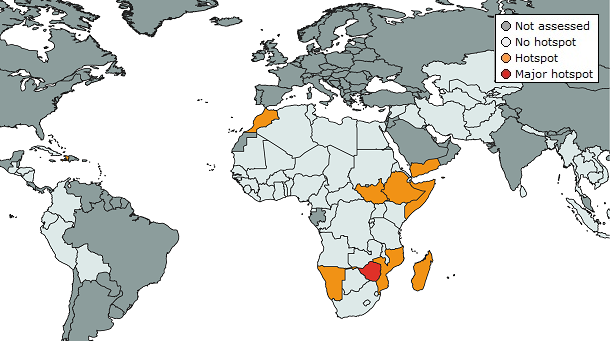
ASAP hotspot assessment of 02.07.2020
The June edition of the JRC's Anomaly Hotspots of Agricultural Production (ASAP) assessment is now available at:
Anomaly Hotspots of Agricultural Production (ASAP) assessment
Main findings of the June global overview:
- Production prospects of main season cereal crops are favourable for Southern Africa as harvest is nearing completion. Production shortfalls are expected in Zimbabwe, southern Mozambique and southern Madagascar.
- In East Africa, good rains have generally favoured good crop conditions. However, floods and desert locusts have negatively impacted Gu and Belg seasons in Somalia and Ethiopia, respectively. The ongoing desert locust invasion appears under control for the main producing areas of the ongoing season, but still poses a threat to unimodal areas (e.g. Sudan) and possibly to the Meher season areas in Ethiopia that will start soon.
- In West and Central Africa, generally good agro-climatic conditions are supporting first season maize crop conditions. However, persisting insecurity and conflict in the area, coupled with the COVID-19 pandemic, are increasing the number of food-insecure households.
- In North Africa, below-average yields reflect the drought conditions that affected parts of the region. In Morocco, barley and wheat production is forecasted significantly below the 5-year average. Western parts of Algeria and central parts of Tunisia are also expecting below-average yields.
- In the Middle East, Central Asia and South Asia, production prospects for winter wheat are generally positive. In Bangladesh, conditions are favourable for planting of Aman rice and similarly in Sri Lanka for the growth of second (Yala) rice. The desert locust infestation seems to be under control in Pakistan and Iran.
- In South-East Asia, favourable conditions for wet season rice are observed in the Mekong Delta of Vietnam, in the Philippines and in Indonesia. In contrast, planting is delayed in in Cambodia, Laos and Myanmar due to low rainfall since the end of 2019.
- The Primera season planting is ongoing under favourable conditions across Central America. The Pacific tropical storms Amanda and Cristobal brought heavy rains and flooding, with El Salvador being the most affected with significant crop losses. COVID-19 continues to pose a critical threat to food security (decrease employment, affect staple food prices).
The next assessment is scheduled for the end of July 2020.
Related Content
Anomaly Hotspots of Agricultural Production (ASAP) assessment
Details
- Publication date
- 2 July 2020
